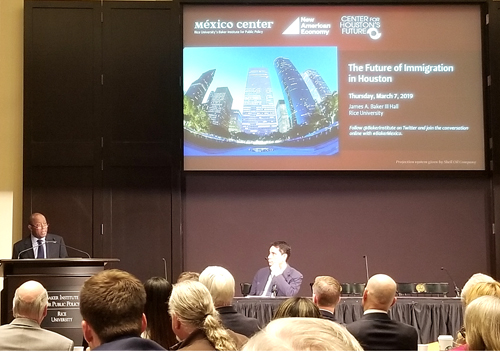The following article was authored by Scott Braddock and originally published on Construction Citizen.
 Houston Mayor Sylvester Turner on Thursday told a group of business leaders and others gathered at Rice University that he’s proud to lead a city that’s fighting the Texas Legislature’s crackdown on undocumented immigrants under last session’s Senate Bill 4.
Houston Mayor Sylvester Turner on Thursday told a group of business leaders and others gathered at Rice University that he’s proud to lead a city that’s fighting the Texas Legislature’s crackdown on undocumented immigrants under last session’s Senate Bill 4.
“Houston always has been and will always be a welcoming place,” Turner said at a summit called “The Future of Immigration in Houston” hosted by the Mexico Center at the Baker Institute, the New American Economy – founded by Michael Bloomberg and Rupert Murdoch – and the Center for Houston’s Future.
As the summit got underway, new numbers were released by the New American Economy showing that of the 6.8 million people living in the Houston area, 1.6 million are immigrants who paid $9.2 billion in federal taxes and $3.5 billion in state and local taxes.
Of the Houston region’s nearly $479 billion GDP in 2016, $124 billion of that was contributed by foreign-born residents, per the study.
The researchers said immigrants helped to “create or preserve” nearly 73,000 local manufacturing jobs “that otherwise would have vanished or moved elsewhere.” Also, immigrant entrepreneurs tend to own businesses in construction, professional services, general services, and other industries, they said.
“The Houston of today is a thriving metropolis that has made contributions in energy, science engineering and other industries,” Turner said, adding that none of it would be possible without the contributions of immigrants.
“They all shared the same value: In Houston anything is possible if you work hard,” Turner said. “Without immigrants, our children will not have a future that is worthy of those who came before us,” he said. “It’s our responsibility to take our rightful place.”
The Center for Houston’s Future simultaneously released this in-depth report.
Among other things, the center’s study looked at immigrants’ presence in the workforce.
“In 2016, the legal and undocumented population accounted for 23 percent of the total population but held 29 percent of all employment in the Houston metro. Assuming historical trends, we project that 57 percent of the region’s jobs created from 2016 to 2036 will be filled by foreign-born workers,” the researchers said. “We estimate that more than two-fifths of all the region’s jobs will be held by immigrants by 2036, rising from 29 percent in 2016 to 43 percent just twenty years later.”
As for the impact on the economy, the center's research looked at three scenarios: A 30 percent increase in immigration by the year 2036, a 30 percent decrease in immigration for the same timeframe, and deportation of all undocumented workers.
“The ‘higher immigration’ scenario adds $67 billion in GDP over the ‘businesses as usual,’ or the base case, roughly one-sixth of Houston’s current economic output,” the researchers said. “The restricted immigration scenario would decrease GDP by $51 billion from the base case. Lastly, we project that deporting all undocumented residents would drop GDP by $36 billion.”
Also during the summit, filmmaker Gregory Kallenberg and former Houston Chronicle Business Columnist Loren Steffy showcased one of the episodes of their documentary series called The Rational Middle.
In the film, they asked the question: Who will rebuild the nation's fourth largest city after Hurricane Harvey’s aftermath overlapped with a state crackdown on undocumented immigrants under SB4, creating a perfect storm for an already-strained labor force.
Pat Kiley, Managing Director at FMI, told the filmmakers the recovery will take three things: Time, money, “and above all, it’s gonna take many additional workers.”
"As any other American city, we're gonna need immigrants to maintain our GPD," Kiley said.
“One of the challenges we face is the storm has acted as an economic event of its own. Not a good one but one that's created a great demand for labor," said Mike Holland, Chief Operating Officer at MAREK, a specialty subcontractor based in Houston.
“Our country and in particular our industry are facing a workforce crisis," Holland said, noting that roughly 10,000 baby boomers are retiring each day. “The next significant number is millennials and their expectations of jobs are a little bit different."
The Rational Middle filmmakers, by the way, will hold a screening in Austin at the Bullock Museum the evening of March 26.

